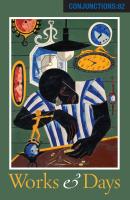![[A Reading by Can Xue]](http://www.conjunctions.com/images/event_image.php?id=131206) Can Xue is a Chinese avant-garde fiction writer and literary critic. English translations of her fiction include Blue Light in the Sky and Other Stories, Five Spice Street, Vertical Motion, The Last Lover (winner of the Best Translated Book Award), and the forthcoming Frontier.
Can Xue is a Chinese avant-garde fiction writer and literary critic. English translations of her fiction include Blue Light in the Sky and Other Stories, Five Spice Street, Vertical Motion, The Last Lover (winner of the Best Translated Book Award), and the forthcoming Frontier.Introduced by Bradford Morrow and followed by a Q&A, this event is free and open to the public; no tickets or reservations are required. The reading is presented by the Innovative Contemporary Fiction Reading Series and cosponsored by the Program in Written Arts, with support from the Chinese Students Organization and Bard’s programs in Chinese and Asian studies.
“If China has one possibility of a Nobel laureate it is Can Xue.” —Susan Sontag
“Can Xue is one of the most innovative and important contemporary writers in world literature. She possesses one of the most glorious, vivid, lyrical, elaborate, poignant, hellacious imaginations on the planet. She is the finest revolutionary Gothicist writing today and the true daughter of Kafka and Borges. No reader emerges from her powerful fictional dreams unscathed, for her work is as dangerous as it is beautiful. She can infiltrate the deepest part of our human experience with such subtlety and totality that it takes my breath away.” —Bradford Morrow
“All that opposes my training, my literary culture, and even my gut instincts as a writer lives in her self-presentation. Here is the writer as true iconoclast, the uncompromising original.” —Porochista Khakpour
“Can Xue has found not just a new direction but a new dimension to move in, a realm where conscious beings experience space, time, and each other unbound from the old rules.” —Music and Literature
“Can Xue is the most original voice to arise in Chinese literature since the midcentury upheavals. Although nothing is predictable here, each line as if plucked anew from space, there is nonetheless a profound organicity. In short, there’s a new world master among us and her name is Can Xue.” —Robert Coover
“The traditional expectation of narrative history in China has been to find a central meaning that could effectively master chaos. Can Xue’s stories are like a piece of dynamite at the foundation of this elaborate edifice.” —Modern Chinese Literature
